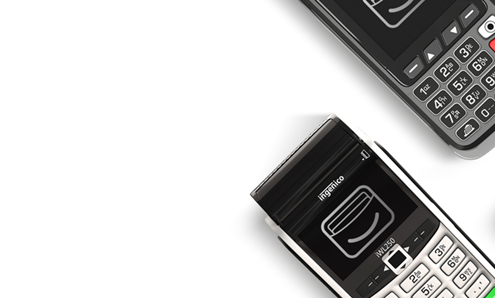Whether it's buying a coffee on the go or snagging that last-minute online deal, a complex chain of events happens behind the scenes of each card transaction to ensure every penny finds its way to where it’s meant to be.
Over 11.6 million card transactions are made every day, so that’s a lot of steps that must be carried out to keep your customers happy – and your business running.
Without a proper credit card payment processing system, your customers could be at risk of payment fraud, and you may not get the money you’re due for each transaction. But what exactly is credit card processing, and how does it happen?
Keep reading as we break it down and explain everything you need to know for your small business.
What is credit card processing?
Credit card processing is a series of events that enables the electronic transfer of funds from a customer's credit card to your merchant account.
While it might seem like the simple tap of a card from the outside, it actually involves multiple steps and participants to ensure every transaction is secure, accurate, and, most importantly, compliant with financial regulations.
For small businesses, understanding the ins and outs of credit card processing is essential for knowing what tools or software you need to accept card payments, the fees you have to pay, and what to do when things go wrong.
Who is involved in credit card processing?
Several parties are involved in each credit card transaction, and each participant is responsible for looking after a particular step. They must work together to complete each transaction smoothly and securely.
Here’s an overview of the required parties:
- Cardholder – The customer who uses a credit or debit card to make a purchase.
- Merchant – That’s you, the business owner, who accepts card transactions as payment for the goods or services you provide.
- POS (point of sale) system – The technology needed to accept payments directly at your brick-and-mortar or online store. POS systems can include card readers, printers, and countertop machines.
- Payment gateway – A payment gateway sends information from the transaction from the POS system to the credit card processor.
- Credit card processor – Also called a payment processor or simply a processor, this party works with the merchant, banks, and card networks. They authorise each transaction and transfer the funds and data to each relevant participant.
- Card networks – These are the companies like Visa, MasterCard, and American Express that operate the networks over which credit card transactions are processed. You can learn more about these card scheme companies here.
- Issuing bank – Also referred to as the issuer or card issuer, these are financial institutions that issue credit cards to consumers. They approve and provide the funds for each transaction on behalf of the cardholder.
- Acquiring bank – On the opposite side to the issuer is the acquirer or acquiring bank. This financial institution maintains the merchant's bank, which receives the payment from card transactions.

What do merchants need to process credit cards?
To accept credit card payments, you'll need a combination of hardware and software to receive and transmit all the information involved in processing.
Hardware
Hardware sounds technical, but it simply refers to any physical equipment needed to accept card payments. Not all merchants accept the same types of card payments, so the hardware required can vary based on needs and requirements.
For in-person transactions at brick-and-mortar stores, you might need a full-scale POS terminal that can process cash, card, mail order and telephone order (MOTO) payments. If you run a market stall that only handles card transactions, you’ll probably need a mobile card machine that doesn’t rely on a fixed internet or power connection.
The right hardware for your business depends on what you need it for and which types of transactions you accept.
Software
Software is any application or program involved in card processing.
Suppose you use a POS system at your brick-and-mortar store. In that case, the POS machine likely runs off software that not only enables card payments but may also let you manage inventory, send email receipts, and offer reporting and analytics.
For online sales, your primary software will be a payment gateway, which securely connects your e-commerce platform to the payment processing network. It encrypts sensitive cardholder information, so the data is transmitted securely between the customer, the merchant, and the banks involved.
How does credit card processing work?
So now you know the players, it’s time to dive into how everything works.
In essence, there are two main steps involved in processing: authorisation and settlement. Put briefly:
- Authorisation is when the transaction is approved or declined
- Settlement is when the funds are moved from the cardholder’s issuing bank to your merchant account
Here’s the process in more detail:
1. Initiation
The transaction journey begins the moment a customer decides to make a purchase with their credit card. This could be by inserting their card for chip and PIN transactions, tapping their card or smart device for contactless payments, or entering their card details online.

2. Authorisation request
Once the card details are entered and the transaction has started, the software transmits the cardholder’s information and transaction details to the credit card processor. The processor forwards the details and an authorisation request through the appropriate card network and to the issuing bank.
3. Authorisation decision
When the issuing bank receives the request, it reviews the transaction details to verify the cardholder’s account, check for sufficient funds, and review any security issues. After completing all these checks, the issuing bank will either approve or decline the transaction.
4. Authorisation response
This decision is then relayed back through the card network to the processor. The card processor then displays the response on the merchant’s POS system or payment gateway, letting the merchant and customer know if the transaction has been approved or denied.
5. Settlement
If the transaction has been approved, the next stage is settlement or batching. This is when businesses submit batches of approved transactions, often at the end of the day when trading is complete, to the payment processor. The transaction details are forwarded to the card networks, which liaise with the issuing and merchant banks to begin the process of actually transferring the funds.
6. Funding
After settlement, the issuing banks transfer the transaction amount into the merchant's account via card networks, minus any processing fees.
The settlement and funding steps usually take 1-3 days to complete after the transaction, but this can vary as some banks and processors may provide next-day or faster settlement times.
For small business owners, understanding the timing of each step can be crucial for managing cash flow. You might come across the term ‘processing day’, which is the next available banking day for transactions taken outside of this period. Transactions taken outside of banking days are combined to be settled together on the next available processing day.
How long does credit card payment take to process?
The time it takes for a credit card payment to process can vary, but typically, the authorisation stage is completed within seconds. Settlement and funding, when the money is transferred to the merchant's bank, usually happens within 1-3 business days.

What credit card processing fees are there for businesses?
In addition to paying to use the hardware and software needed to accept card transactions, there are also several fees that must be paid to the various players in the payment process.
These fees are billed to the merchant, so knowing exactly what costs you need to pay – and how much you’ll have to pay – can help you choose the right processing partner.
Fees can make up roughly 1.5-3.5% of each transaction, but these vary depending on the parties involved. Here’s an overview of three of the main fees you might encounter:
- Interchange fees – These are paid to the cardholder’s issuing bank for each transaction. The rate of interchange fees varies depending on the card network, type of card, and payment method. Interchange fees tend to make up the largest portion of credit card processing fees.
- Assessment fees – These must be paid to the card networks – Visa, MasterCard, etc. – in exchange for using their payment infrastructures. Assessment fees are often based on how many transactions and how much money is processed through their network.
- Payment processor fee – This is the fee your credit card processor charges for their services, like the authorisation, settlement, and transfer of information with the other involved parties.
Other fees you’ll have to consider:
- Setup and activation fees – Some processors charge one-off fees to set up your account and activate your service.
- Monthly or annual fees – Monthly service fees or annual membership fees cover the processor's ongoing services, customer support, and account maintenance.
- Payment gateway fees – As well as any software fees, you might need to pay to use a payment gateway if you accept card transactions online. Depending on who you choose for your payment gateway, the fees could be charged on a monthly or as a percentage of each transaction.
- Chargeback fees – In the event that a customer disputes a transaction, card processors may request a fee for each chargeback that occurs.
- PCI compliance fees – Any business that accepts card payments must follow the latest regulations outlined in the Payment Card Industry Data Security Standard (PCI DSS) to make sure transactions are safe and secure. Some card processing companies offer PCI compliance as an additional service, for which merchants will be required to pay extra.
Why is credit card processing important for small businesses?
Understanding credit card processing isn't just about knowing what goes on each time your customer taps their card. Nailing down a credit card processing system that works for your business can be beneficial because it can:
1. Improve customer experience
Now, more than ever, customers expect seamless and flexible payment options. Our latest research found that contactless payments are favoured above cash, and 79% of shoppers choose their favourite method based on convenience. This highlights how a smooth and frictionless experience matters, so facilitating card payment options means you can keep your customers happy.
2. Boost sales and revenue
Accepting credit cards can also directly influence your sales and revenue. This is because Dun & Bradstreet’s famously cited study found people spend up to 18% more when using credit cards instead of cash.
Plus, being able to process credit cards opens your business to online sales, broadening your market reach and providing opportunities for growth beyond your physical location.
3. Secure transactions
Security is a growing concern for both merchants and consumers, with people across the UK losing £258.9m to card fraud in the first half of 2023. Credit card processors use encryption technology and follow PCI DSS security measures to protect sensitive data, which can significantly reduce the risk of data breaches and fraud.
For online transactions, Transmission Control Protocol (TCP) is a communications standard that allows applications and programs to communicate and exchange data over a network. So, when a customer enters their credit card information on your website, TCP helps deliver their data securely to the payment gateway and processor, minimising the risk of data breaches.
Having a complaint credit card processing strategy in place protects your business and your customers, building trust and your reputation.
Start accepting card transactions with takepayments
Whether a portable, countertop, or mobile device, our card machines for small businesses can help make payments more manageable.
To find out more about any of our payment solutions or discuss your options in more detail, contact our dedicated experts today.





